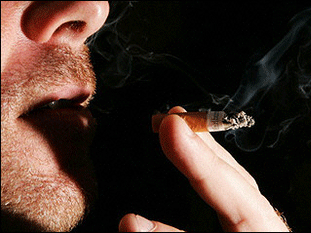Smoking reduces effects of alcohol, leads to more drinking
(AFP)
Updated: 2006-07-27 17:28

Smoking reduces the effects of alcohol and may even encourage people to drink
more, according to research published in the journal "Alcoholism: Clinical and
Experimental Research".
Scientists who studied rats exposed to a combination of alcohol and nicotine
found that nicotine reduced blood alcohol concentrations at levels which could
have an impact in human smokers -- and explain why cigarettes and alcohol are
often seen to go together.
"Since the desired effect of alcohol is significantly diminished by nicotine
-- particularly among heavy or binge drinkers such as college students -- this
may encourage drinkers to drink more to achieve the pleasurable or expected
effect," said Wei-Jung Chen, from the Texas A and M University Health Science
Center in College Station, who led the reeearch.
"In other words, cigarette smoking appears to promote the consumption of
alcohol."
Susan Maier, health scientist administrator at the US National Institutes of
Health, said: "In the human condition, persons desiring to drink 'to effect'
will need to drink more alcohol while smoking in order to reach this effect, and
this will lead to an increased amount and lingering presence of toxic
by-products of alcohol metabolism, such as acetaldehyde.
"This would be particularly harmful for adolescents and young adult drinkers,
since these populations are amenable to this type of drinking pattern, and may
develop chronic alcohol-related diseases earlier in life because of it."
One effect of the nicotine/alcohol interaction might be to permanently alter
metabolism, she added. This could reduce the effect of beneficial medicinal
drugs in people who both smoke and drink.
|